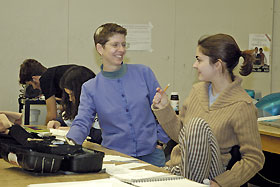For more archives, go to the Advance Archive/Search Page.
Award-Winning Adviser Helps
Students Develop Lifelong Skills
 |
|
Cora Lynn Deibler, associate department head of art and art history, standing, speaks with Kerry Kozaczuk, a senior majoring in illustration, one of her advisees, during an open studio class. |
|
Photo by Dollie Harvey
|
Cora Lynn Deibler not only helps students with their academics, she offers them lifelong skills.
Deibler, associate department head and associate professor of art and art history, has been advising UConn students about their plans of study – and more – for the past eight years. Earlier this year, she was named recipient of the Outstanding Faculty Advisor Award.
“One of my goals in advising students,” Deibler says, “is to help them learn to make intelligent, meaningful choices about their educations, careers, and lives. The advisor-advisee relationship is a partnership in which the greatest goal is developing the students’ self-reliance so they can comfortably navigate the University and their futures.”
Deibler says advising involves much more than helping students sequence courses or fulfill graduation requirements. She encourages students to talk about themselves. “Advising includes helping a student change directions, pursue study abroad, address a difficult roommate situation, transition to another part of the University, or look for a job,” she says.
Deibler, whose specialty is illustration, officially advises about 20 students, from freshmen to seniors, who are working on their BFA’s in art. Informally, she advises many more, in her role as associate department head.
She says a good advisor must be familiar with the resources offered at the University.
“One of the things that’s really important as an advisor is knowing what resources the University offers, because students have all kinds of issues and concerns,” she says. “We’re dealing with the whole person, and if the whole person isn’t taken care of, academics will suffer. So if a student is overwhelmed with a financial aid situation, we need to deal with that.”
Deibler says it’s important to listen carefully. “It’s important to try to resist the urge to jump in and solve a student’s problem,” she says. Often they’ll come in with what they perceive to be the issue, but it’s really “an issue behind that issue.”
Good advising should be a mentoring situation, she says. “It’s critical to remember that the students are young professionals who would like to pursue careers in our fields. As advisors, we need to help them achieve those goals. Sometimes it’s the pragmatic pieces of the program that we’ll work with, and sometimes it’s making sure that they get to New York City to see a particular show. Other times it might be talking with them about their future.”
In helping students make the transition from the University to the professional world, Deibler might discuss whether the student wants to pursue graduate education, or go directly into industry. “We talk about business, professional communication, building a resume, and networking,” she says.
Deibler’s advisees visit her office, call, or e-mail her for advice. Many of them are also in her classes, which she says offers the chance “to really know them as multi-faceted individuals and respond to them as such.”
Professional careers in the arts are competitive, Deibler says: “Sending students out with their new degrees is challenging. You won’t see every student who graduates with an arts degree end up in the field, but they may find other careers where their arts background is beneficial. The arts are about expression, intellectual inquiry, exploration, and creativity. Hopefully, we do a good job preparing them.”
Students whom Deibler currently advises and has advised in the past say she has made an impact on their lives. “I have never left Professor Deibler’s office without good advice,” says Ashley Dorner, a senior studying illustration. “She is someone I can talk to about my future, or any concerns.”
Kerry Kozacuk, a senior majoring in illustration with a minor in women’s studies, says Deibler “is attentive to students’ struggles and needs” and “goes beyond the call of duty as a student advisor.”
Kozacuk says Deibler has helped her and other illustration students find internships, as well as providing other leads for employment.
Deibler says through her role as an advisor, she has learned much about herself. “Hopefully my advisees also sense this is a valuable shared endeavor,” she says. “I was once a student too, so there is always a combination of coffee, tissues, and chocolate in my office.”

